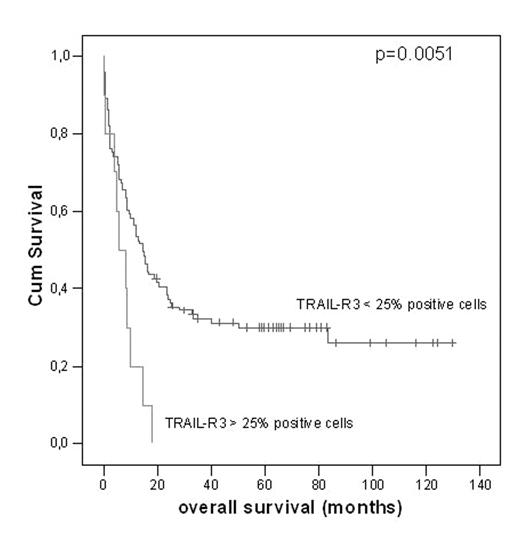Abstract
Since chemotherapy and transplantation can cure only around 35% of patients with acute myeloid leukemia (AML), there is still need for complementary and targeted treatment modalities. One of them could be the use of TNF-related apoptosis-inducing ligand (TRAIL). TRAIL is expressed by effector T cells and induces apoptosis via the death receptor intrinsic pathway. Activation of this pathway in addition to the mitochondrial pathway (by chemotherapy) has synergistic effects in vitro. In human, 4 membrane bound receptors have been identified: two of them (R1 and R2) contain a functional death domain and are capable of starting the apoptotic cascade, and two others (R3 and R4) lack a functional death domain and function as decoy receptors. Most normal cells express R3 and R4, where many tumor cells express R1 and R2. This makes soluble recombinant TRAIL an attractive candidate for targeted therapy; phase 1 clinical studies for solid tumors are launched. Until now, sparse data on TRAIL sensitivity of myeloid leukemic cells have demonstrated low TRAIL sensitivity. We investigated blood and bone-marrow samples of 113 patients with AML for TRAIL receptor expression by flow-cytometry. In contrast with published data, we found presumably (pro-apoptotic) R1 and R2 expression (mean percentage positive cells 16% and 34%, range 0–79% and 0–97% respectively) versus R3 and R4 expression (mean 9% and 10%, range 0–71% an 0–45%) indicating a TRAIL sensitive profile for myeloid blasts. Surprisingly, the expression of the anti-apoptotic R3 strongly correlated to survival. Expression of > 25% blasts positive for R3 resulted in shortened overall survival (p=0.0051), see figure 1. In multivariate analysis R3 expression remained a significant prognostic factor next to cytogenetics (p=0.03 and p= 0.015 respectively). In vitro studies on 4 myeloid leukemic cell lines confirmed TRAIL sensitivity in cell lines that expressed R1 and R2. Furthermore, simultaneous expression of R3 clearly reduced the amount of apoptosis, suggesting that TRAIL effects are inhibited by binding to R3. TRAIL induction studies on fresh leukemic samples are currently underway in our laboratory.
In conclusion, our data suggest that, in contrast to earlier reports, there might be a role for TRAIL in apoptosis induction of AML blasts. R3 expression is a strong predictor for overall survival and modulation of R3 might yield additional new therapeutic options for AML patients.
Author notes
Corresponding author


This feature is available to Subscribers Only
Sign In or Create an Account Close Modal